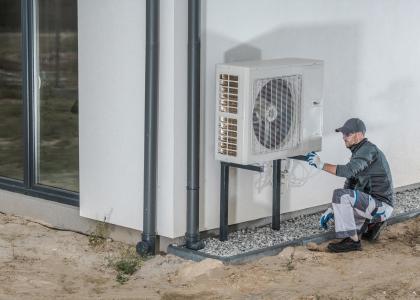Earth Day turns 45 tomorrow, which means spring is in full swing and summer is just over the horizon. But you can stay calm, stay cool, and lower your carbon footprint, too, despite the approaching heat, by putting energy efficiency to work for you. Here is a sampling of tips gleaned from our recently launched smarterhouse.org, the evolution of ACEEE’s Consumer Guide to Home Energy Savings. Following these tips can save you money by cutting down on your utility bills, make your home more comfortable, as well as improve its performance, and cut your energy waste.
As you dream about warmer weather and summer activities, keep in mind that costs can creep up during the summer when you’re cooling your home. Cooling systems account for about 17% of energy use in the typical house. Here are our recommendations for keeping cool and saving energy:
Upgrade your cooling system. Thinking about improving your home cooling system before it gets really hot? If you are unsure, or your central air conditioning is 10-15 years old, you may want to consider calling in a qualified home performance contractor so you don’t end up selecting an inefficient model that will add to your expenses over the long term. Bear in mind that your decision should depend on your climate, and whether you are replacing an existing unit or installing an entirely new system.
Use your AC less and fans more. There are several measures you can take to ensure optimum performance of your AC. Start by keeping the air filters clean so they don’t impede air flow and damage the unit, conditioning only when ventilation is inadequate, and avoiding cooling unoccupied rooms. You can also use your AC in conjunction with ceiling or standing fans for more efficient cooling. Whenever you leave your home, adjust your thermostat to a warmer temperature to save energy. Or install a programmable thermostat, so you don’t need to remember to manually change the thermostat every day—you can save 3–5% on air conditioning costs for each degree that you raise the thermostat.
Drive green. Whether you are driving to the beach, the movies, or a mountaintop camping site, you can reduce your environmental impact not only by driving a more eco-friendly vehicle, but also by being more efficient about the way you maintain and drive your car. Little changes like keeping your tires properly inflated or carrying a lighter load when you travel can make a difference—Did you know that carrying around an extra 100 pounds reduces fuel economy by about 1%?
Change your lights. Replace traditional heat-generating incandescent light bulbs with compact fluorescents (CFLs) or light-emitting diodes (LEDs), and think about installing light sensors and lamp timers to reinforce those energy savings. Lighting makes up about 5–10% of total energy use in the average American home, costing the typical household between $75 and $200 per year in electricity.
Keep your beer cold. The last thing you need is a non-functioning fridge in the middle of summer. Check the age and condition of your major appliances, especially the refrigerator. You may want to replace it with a more energy-efficient model before it dies. Note that it is generally much less expensive to buy and operate one big refrigerator rather than two small ones, so if you are thinking of buying a second one or keeping your old one for extra storage, you might want to reconsider. While you are at it, replace aging, inefficient appliances such as your dishwasher, oven, or dryer. Even if the appliance has a few useful years left, a top-efficiency model is generally a good investment. Make sure you know what to look for in order to select the most efficient model to save on energy and long-term costs.
Scrape, don’t rinse. Summer calls for a lot of hosting of family and friends. When you’re cleaning up after those parties, this will likely increase the number of dishwasher loads. A brand-new dishwasher isn’t the only way you can save and operate it efficiently. For example, instead of pre-rinsing all your dishes, before loading, simply scrape off any food and empty liquids to save time, water, and energy. If you find you must rinse dishes first, get in the habit of using cold water.
Find and seal air leaks. Did you know that air leakage accounts for almost 30% of heat lost from your house? Many of these holes in the building envelope are found in the attic, in places you might not think to look. Look into how to find and seal some of these leaks to make your house more comfortable before the hot summer weather begins.
Get an energy audit. Call in a home energy specialist (also known as house doctors, energy auditors, raters, or home performance contractors) before making major efficiency improvements to your house. They will figure out where and why energy is being wasted, and what you should do about it. Home energy specialists study the building as a system, and perform full checkups that are designed to address overall safety, comfort, energy efficiency, and indoor air quality.
For a robust list of changes you can make today, this month, or over the course of the year, check out the Home Energy Checklist.
Happy Earth Day, every day!



